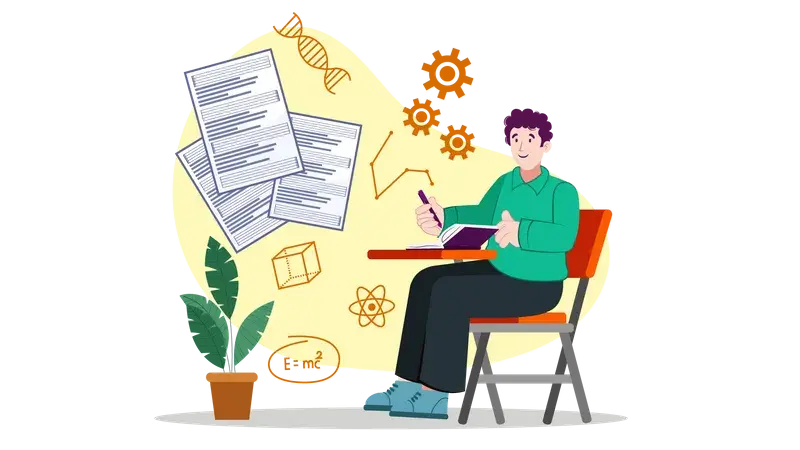CSIR NET (Council of Scientific and Industrial Research National Eligibility Test) is one of the most prestigious examinations for aspiring researchers in India. It is conducted by the CSIR to determine eligibility for the award of Junior Research Fellowship (JRF) and eligibility for lectureship in various fields of science. For candidates preparing for this exam, comprehensive and structured notes are a crucial part of the preparation strategy.
Here we provide an in-depth overview of CSIR NET, the importance of notes, and tips on creating and utilizing effective notes.
Importance of CSIR NET Notes for Preparation
Effective note-taking is crucial for CSIR NET preparation for several reasons:
- Helps in Conceptual Clarity: Scientific subjects often require deep understanding of complex concepts. Writing down key points helps candidates understand and retain difficult ideas.
- Revision-Friendly: The sheer volume of the syllabus makes it challenging to revise everything just before the exam. Well-organized notes help in quick revisions, ensuring that candidates can recall essential concepts on the day of the exam.
- Time Management: Taking notes forces candidates to filter important information and prioritize topics. This helps in creating a more focused study plan, making time management more efficient.
- Easy to Refer: Having concise, well-organized notes helps candidates avoid the hassle of referring to textbooks repeatedly. Notes allow candidates to revisit key ideas, formulas, and definitions in a short amount of time.
How to Create Effective CSIR NET Notes?
Creating effective notes for CSIR NET requires strategy and planning. Here’s how you can go about making high-quality, exam-oriented notes:
-
Know Your Syllabus and Focus Areas
-
-
- Start by familiarizing yourself with the complete syllabus. Since the CSIR NET exam is divided into five subjects, ensure you identify the weightage and important topics within each subject. For example, in Life Sciences, topics like Genetics, Biochemistry, and Ecology are considered crucial. Once you know which topics are important, focus your notes on these areas.
-
-
Make Clear and Concise Notes
-
-
- While making notes, clarity and conciseness are essential. Long-winded explanations can become overwhelming. Aim for brevity by writing down only the key points. Use bullet points, headings, and subheadings to organize your content logically. Highlight important formulas, definitions, and equations using bold or underlined text.
-
-
Use Diagrams and Charts
-
-
- In scientific subjects, visual representation of concepts through diagrams, flow charts, and graphs is often easier to understand and remember. For example, in Physical Sciences, diagrams like energy level diagrams or molecular orbital diagrams play an essential role in understanding concepts. Whenever possible, incorporate such visuals into your notes to enhance comprehension.
-
-
Summarize Each Topic
-
-
- After completing each sub-topic, write a brief summary. This summary should capture the crux of the topic and provide a quick reference. Reviewing these summaries will help you grasp the key ideas quickly during revision.
-
-
Highlight Key Formulas and Definitions
-
-
- In subjects like Physical Sciences and Mathematical Sciences, formulas and equations are of utmost importance. Dedicate a section of your notes specifically for formulas and make sure to write down their derivation, application, and important examples. Similarly, in Life Sciences, make a list of important definitions and their real-world applications.
-
-
Use Mnemonics and Memory Aids
-
-
- Mnemonics are great for memorizing lengthy and complex information. For example, in Earth Sciences, memorizing various geological time periods might seem difficult. Using mnemonic techniques can help recall these periods easily. Similarly, in Chemical Sciences, remembering complex reaction mechanisms can be simplified using acronyms or other memory tricks.
-
-
Incorporate Previous Year’s Question Papers
-
- While preparing your notes, refer to previous year’s question papers to understand the exam’s pattern. Include important questions and answers in your notes so that you can practice them later during revisions. This will also help you identify recurring topics.
Best Practices for Organizing CSIR NET Notes
To maximize the effectiveness of your notes, it’s important to organize them efficiently. Here are some useful tips:
-
Use Dividers or Folders for Each Subject
-
-
- Since CSIR NET covers a wide range of subjects, use dividers or folders for each subject to keep your notes organized. Label the sections clearly and maintain a systematic order.
-
-
Date and Versioning
-
-
- As you revise and update your notes, make sure to add dates and versions. This allows you to track changes and improvements over time. It also helps if you want to look back at earlier notes.
-
-
Make Digital Copies
-
-
- Consider maintaining a digital version of your notes. This allows for easy access and ensures you don’t lose them. You can also use tools like OneNote, Evernote, or Google Keep for note-taking, where you can organize, search, and revise your notes on the go.
-
-
Highlight and Color Code
-
- Use highlighters and color codes to separate key concepts. For example, use one color for definitions, another for formulas, and a different one for examples. This makes it easier to locate and prioritize information during revision.
Revision Strategy Using Notes
Revising your notes effectively is essential for success in CSIR NET. Here’s a practical revision strategy:
-
Start Early
-
-
- Begin your revision at least 2–3 months before the exam. This allows you to revise each subject multiple times and ensure you have a solid grasp of all concepts.
-
-
Focus on Weak Areas
-
-
- During revisions, identify the areas where you are weak or uncertain. Spend more time reviewing these topics and try to strengthen your understanding by revisiting notes or solving additional practice problems.
-
-
Mock Tests and Practice Papers
-
-
- Once you’ve revised all your notes, practice by solving mock tests and previous year papers. This will help you assess your understanding and get used to the exam’s format.
-
-
Keep Revising
-
- Make revision a part of your regular study routine. Go over your notes weekly and focus on concepts that are difficult or need further clarification. Consistent revision ensures that all the information stays fresh in your mind.














